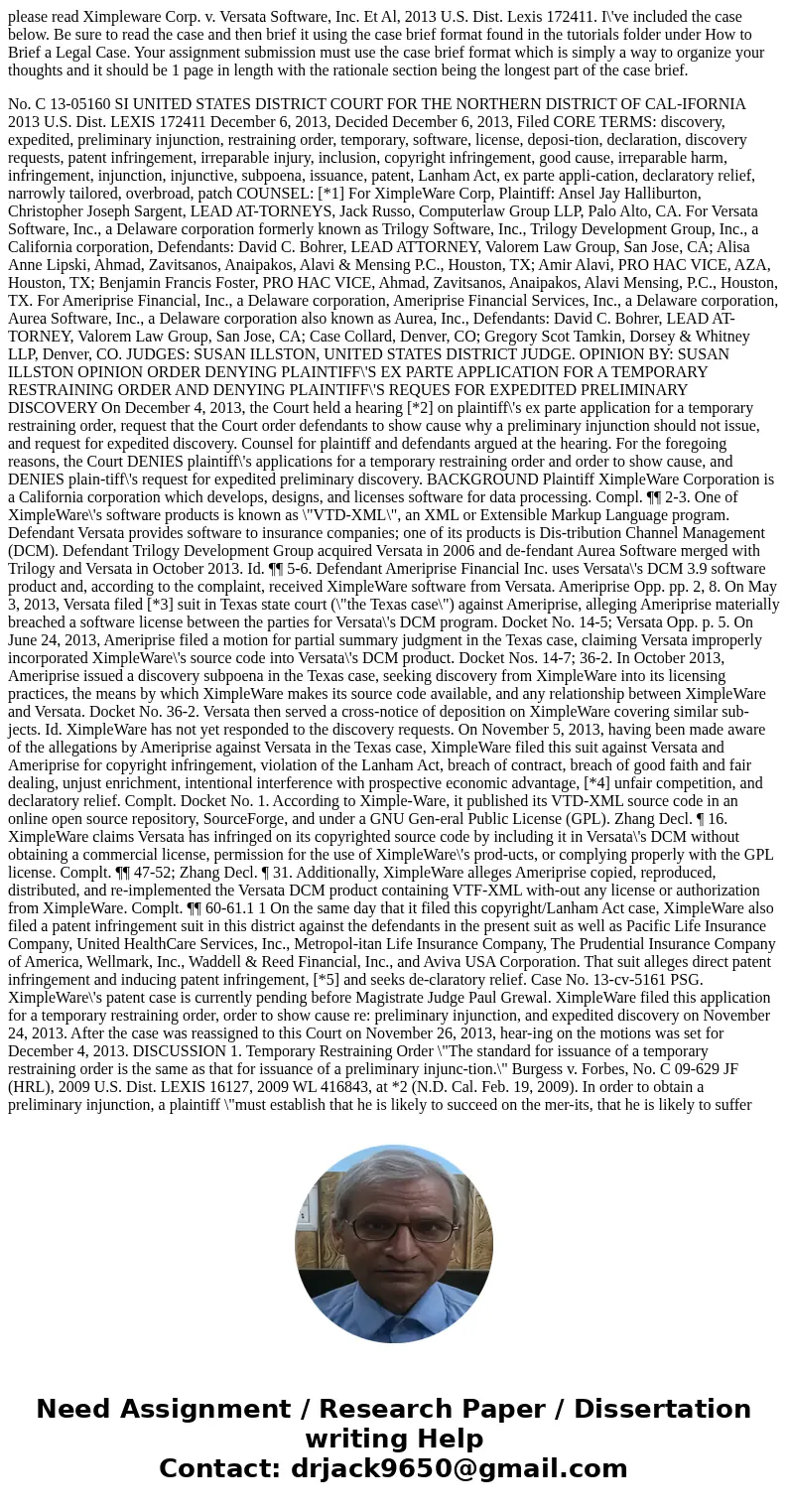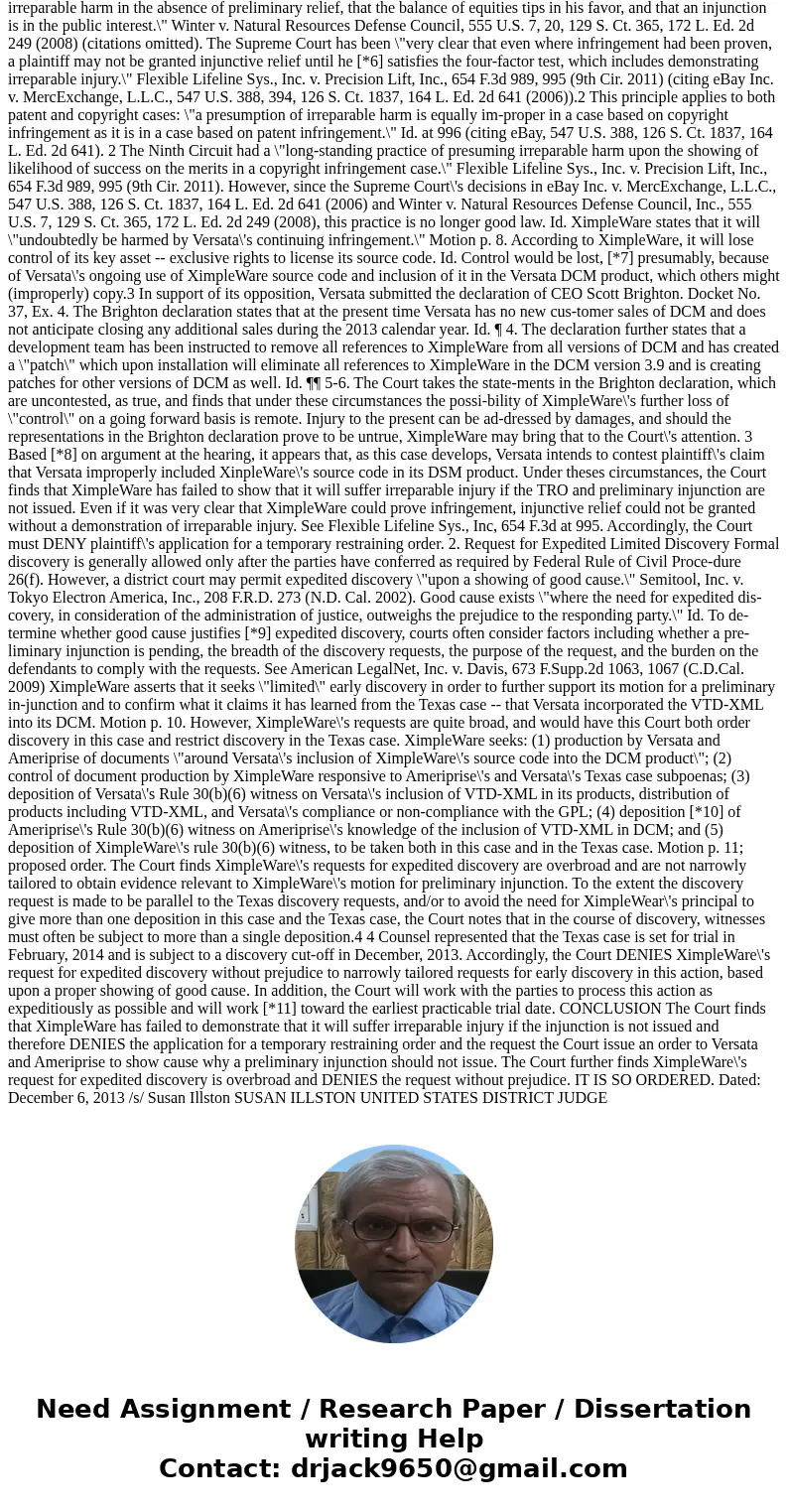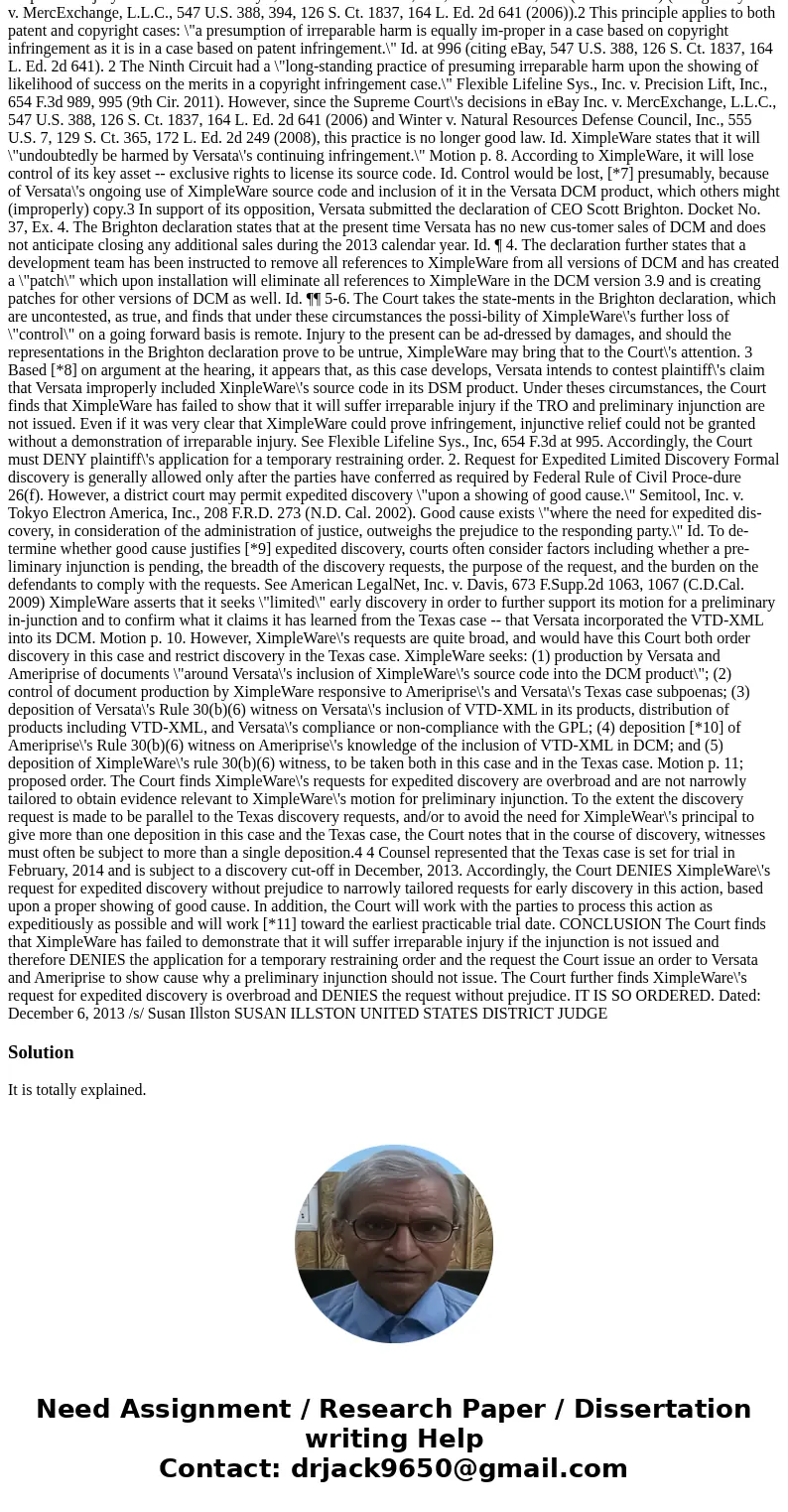please read Ximpleware Corp v Versata Software Inc Et Al 201
please read Ximpleware Corp. v. Versata Software, Inc. Et Al, 2013 U.S. Dist. Lexis 172411. I\'ve included the case below. Be sure to read the case and then brief it using the case brief format found in the tutorials folder under How to Brief a Legal Case. Your assignment submission must use the case brief format which is simply a way to organize your thoughts and it should be 1 page in length with the rationale section being the longest part of the case brief.
No. C 13-05160 SI UNITED STATES DISTRICT COURT FOR THE NORTHERN DISTRICT OF CAL-IFORNIA 2013 U.S. Dist. LEXIS 172411 December 6, 2013, Decided December 6, 2013, Filed CORE TERMS: discovery, expedited, preliminary injunction, restraining order, temporary, software, license, deposi-tion, declaration, discovery requests, patent infringement, irreparable injury, inclusion, copyright infringement, good cause, irreparable harm, infringement, injunction, injunctive, subpoena, issuance, patent, Lanham Act, ex parte appli-cation, declaratory relief, narrowly tailored, overbroad, patch COUNSEL: [*1] For XimpleWare Corp, Plaintiff: Ansel Jay Halliburton, Christopher Joseph Sargent, LEAD AT-TORNEYS, Jack Russo, Computerlaw Group LLP, Palo Alto, CA. For Versata Software, Inc., a Delaware corporation formerly known as Trilogy Software, Inc., Trilogy Development Group, Inc., a California corporation, Defendants: David C. Bohrer, LEAD ATTORNEY, Valorem Law Group, San Jose, CA; Alisa Anne Lipski, Ahmad, Zavitsanos, Anaipakos, Alavi & Mensing P.C., Houston, TX; Amir Alavi, PRO HAC VICE, AZA, Houston, TX; Benjamin Francis Foster, PRO HAC VICE, Ahmad, Zavitsanos, Anaipakos, Alavi Mensing, P.C., Houston, TX. For Ameriprise Financial, Inc., a Delaware corporation, Ameriprise Financial Services, Inc., a Delaware corporation, Aurea Software, Inc., a Delaware corporation also known as Aurea, Inc., Defendants: David C. Bohrer, LEAD AT-TORNEY, Valorem Law Group, San Jose, CA; Case Collard, Denver, CO; Gregory Scot Tamkin, Dorsey & Whitney LLP, Denver, CO. JUDGES: SUSAN ILLSTON, UNITED STATES DISTRICT JUDGE. OPINION BY: SUSAN ILLSTON OPINION ORDER DENYING PLAINTIFF\'S EX PARTE APPLICATION FOR A TEMPORARY RESTRAINING ORDER AND DENYING PLAINTIFF\'S REQUES FOR EXPEDITED PRELIMINARY DISCOVERY On December 4, 2013, the Court held a hearing [*2] on plaintiff\'s ex parte application for a temporary restraining order, request that the Court order defendants to show cause why a preliminary injunction should not issue, and request for expedited discovery. Counsel for plaintiff and defendants argued at the hearing. For the foregoing reasons, the Court DENIES plaintiff\'s applications for a temporary restraining order and order to show cause, and DENIES plain-tiff\'s request for expedited preliminary discovery. BACKGROUND Plaintiff XimpleWare Corporation is a California corporation which develops, designs, and licenses software for data processing. Compl. ¶¶ 2-3. One of XimpleWare\'s software products is known as \"VTD-XML\", an XML or Extensible Markup Language program. Defendant Versata provides software to insurance companies; one of its products is Dis-tribution Channel Management (DCM). Defendant Trilogy Development Group acquired Versata in 2006 and de-fendant Aurea Software merged with Trilogy and Versata in October 2013. Id. ¶¶ 5-6. Defendant Ameriprise Financial Inc. uses Versata\'s DCM 3.9 software product and, according to the complaint, received XimpleWare software from Versata. Ameriprise Opp. pp. 2, 8. On May 3, 2013, Versata filed [*3] suit in Texas state court (\"the Texas case\") against Ameriprise, alleging Ameriprise materially breached a software license between the parties for Versata\'s DCM program. Docket No. 14-5; Versata Opp. p. 5. On June 24, 2013, Ameriprise filed a motion for partial summary judgment in the Texas case, claiming Versata improperly incorporated XimpleWare\'s source code into Versata\'s DCM product. Docket Nos. 14-7; 36-2. In October 2013, Ameriprise issued a discovery subpoena in the Texas case, seeking discovery from XimpleWare into its licensing practices, the means by which XimpleWare makes its source code available, and any relationship between XimpleWare and Versata. Docket No. 36-2. Versata then served a cross-notice of deposition on XimpleWare covering similar sub-jects. Id. XimpleWare has not yet responded to the discovery requests. On November 5, 2013, having been made aware of the allegations by Ameriprise against Versata in the Texas case, XimpleWare filed this suit against Versata and Ameriprise for copyright infringement, violation of the Lanham Act, breach of contract, breach of good faith and fair dealing, unjust enrichment, intentional interference with prospective economic advantage, [*4] unfair competition, and declaratory relief. Complt. Docket No. 1. According to Ximple-Ware, it published its VTD-XML source code in an online open source repository, SourceForge, and under a GNU Gen-eral Public License (GPL). Zhang Decl. ¶ 16. XimpleWare claims Versata has infringed on its copyrighted source code by including it in Versata\'s DCM without obtaining a commercial license, permission for the use of XimpleWare\'s prod-ucts, or complying properly with the GPL license. Complt. ¶¶ 47-52; Zhang Decl. ¶ 31. Additionally, XimpleWare alleges Ameriprise copied, reproduced, distributed, and re-implemented the Versata DCM product containing VTF-XML with-out any license or authorization from XimpleWare. Complt. ¶¶ 60-61.1 1 On the same day that it filed this copyright/Lanham Act case, XimpleWare also filed a patent infringement suit in this district against the defendants in the present suit as well as Pacific Life Insurance Company, United HealthCare Services, Inc., Metropol-itan Life Insurance Company, The Prudential Insurance Company of America, Wellmark, Inc., Waddell & Reed Financial, Inc., and Aviva USA Corporation. That suit alleges direct patent infringement and inducing patent infringement, [*5] and seeks de-claratory relief. Case No. 13-cv-5161 PSG. XimpleWare\'s patent case is currently pending before Magistrate Judge Paul Grewal. XimpleWare filed this application for a temporary restraining order, order to show cause re: preliminary injunction, and expedited discovery on November 24, 2013. After the case was reassigned to this Court on November 26, 2013, hear-ing on the motions was set for December 4, 2013. DISCUSSION 1. Temporary Restraining Order \"The standard for issuance of a temporary restraining order is the same as that for issuance of a preliminary injunc-tion.\" Burgess v. Forbes, No. C 09-629 JF (HRL), 2009 U.S. Dist. LEXIS 16127, 2009 WL 416843, at *2 (N.D. Cal. Feb. 19, 2009). In order to obtain a preliminary injunction, a plaintiff \"must establish that he is likely to succeed on the mer-its, that he is likely to suffer irreparable harm in the absence of preliminary relief, that the balance of equities tips in his favor, and that an injunction is in the public interest.\" Winter v. Natural Resources Defense Council, 555 U.S. 7, 20, 129 S. Ct. 365, 172 L. Ed. 2d 249 (2008) (citations omitted). The Supreme Court has been \"very clear that even where infringement had been proven, a plaintiff may not be granted injunctive relief until he [*6] satisfies the four-factor test, which includes demonstrating irreparable injury.\" Flexible Lifeline Sys., Inc. v. Precision Lift, Inc., 654 F.3d 989, 995 (9th Cir. 2011) (citing eBay Inc. v. MercExchange, L.L.C., 547 U.S. 388, 394, 126 S. Ct. 1837, 164 L. Ed. 2d 641 (2006)).2 This principle applies to both patent and copyright cases: \"a presumption of irreparable harm is equally im-proper in a case based on copyright infringement as it is in a case based on patent infringement.\" Id. at 996 (citing eBay, 547 U.S. 388, 126 S. Ct. 1837, 164 L. Ed. 2d 641). 2 The Ninth Circuit had a \"long-standing practice of presuming irreparable harm upon the showing of likelihood of success on the merits in a copyright infringement case.\" Flexible Lifeline Sys., Inc. v. Precision Lift, Inc., 654 F.3d 989, 995 (9th Cir. 2011). However, since the Supreme Court\'s decisions in eBay Inc. v. MercExchange, L.L.C., 547 U.S. 388, 126 S. Ct. 1837, 164 L. Ed. 2d 641 (2006) and Winter v. Natural Resources Defense Council, Inc., 555 U.S. 7, 129 S. Ct. 365, 172 L. Ed. 2d 249 (2008), this practice is no longer good law. Id. XimpleWare states that it will \"undoubtedly be harmed by Versata\'s continuing infringement.\" Motion p. 8. According to XimpleWare, it will lose control of its key asset -- exclusive rights to license its source code. Id. Control would be lost, [*7] presumably, because of Versata\'s ongoing use of XimpleWare source code and inclusion of it in the Versata DCM product, which others might (improperly) copy.3 In support of its opposition, Versata submitted the declaration of CEO Scott Brighton. Docket No. 37, Ex. 4. The Brighton declaration states that at the present time Versata has no new cus-tomer sales of DCM and does not anticipate closing any additional sales during the 2013 calendar year. Id. ¶ 4. The declaration further states that a development team has been instructed to remove all references to XimpleWare from all versions of DCM and has created a \"patch\" which upon installation will eliminate all references to XimpleWare in the DCM version 3.9 and is creating patches for other versions of DCM as well. Id. ¶¶ 5-6. The Court takes the state-ments in the Brighton declaration, which are uncontested, as true, and finds that under these circumstances the possi-bility of XimpleWare\'s further loss of \"control\" on a going forward basis is remote. Injury to the present can be ad-dressed by damages, and should the representations in the Brighton declaration prove to be untrue, XimpleWare may bring that to the Court\'s attention. 3 Based [*8] on argument at the hearing, it appears that, as this case develops, Versata intends to contest plaintiff\'s claim that Versata improperly included XinpleWare\'s source code in its DSM product. Under theses circumstances, the Court finds that XimpleWare has failed to show that it will suffer irreparable injury if the TRO and preliminary injunction are not issued. Even if it was very clear that XimpleWare could prove infringement, injunctive relief could not be granted without a demonstration of irreparable injury. See Flexible Lifeline Sys., Inc, 654 F.3d at 995. Accordingly, the Court must DENY plaintiff\'s application for a temporary restraining order. 2. Request for Expedited Limited Discovery Formal discovery is generally allowed only after the parties have conferred as required by Federal Rule of Civil Proce-dure 26(f). However, a district court may permit expedited discovery \"upon a showing of good cause.\" Semitool, Inc. v. Tokyo Electron America, Inc., 208 F.R.D. 273 (N.D. Cal. 2002). Good cause exists \"where the need for expedited dis-covery, in consideration of the administration of justice, outweighs the prejudice to the responding party.\" Id. To de-termine whether good cause justifies [*9] expedited discovery, courts often consider factors including whether a pre-liminary injunction is pending, the breadth of the discovery requests, the purpose of the request, and the burden on the defendants to comply with the requests. See American LegalNet, Inc. v. Davis, 673 F.Supp.2d 1063, 1067 (C.D.Cal. 2009) XimpleWare asserts that it seeks \"limited\" early discovery in order to further support its motion for a preliminary in-junction and to confirm what it claims it has learned from the Texas case -- that Versata incorporated the VTD-XML into its DCM. Motion p. 10. However, XimpleWare\'s requests are quite broad, and would have this Court both order discovery in this case and restrict discovery in the Texas case. XimpleWare seeks: (1) production by Versata and Ameriprise of documents \"around Versata\'s inclusion of XimpleWare\'s source code into the DCM product\"; (2) control of document production by XimpleWare responsive to Ameriprise\'s and Versata\'s Texas case subpoenas; (3) deposition of Versata\'s Rule 30(b)(6) witness on Versata\'s inclusion of VTD-XML in its products, distribution of products including VTD-XML, and Versata\'s compliance or non-compliance with the GPL; (4) deposition [*10] of Ameriprise\'s Rule 30(b)(6) witness on Ameriprise\'s knowledge of the inclusion of VTD-XML in DCM; and (5) deposition of XimpleWare\'s rule 30(b)(6) witness, to be taken both in this case and in the Texas case. Motion p. 11; proposed order. The Court finds XimpleWare\'s requests for expedited discovery are overbroad and are not narrowly tailored to obtain evidence relevant to XimpleWare\'s motion for preliminary injunction. To the extent the discovery request is made to be parallel to the Texas discovery requests, and/or to avoid the need for XimpleWear\'s principal to give more than one deposition in this case and the Texas case, the Court notes that in the course of discovery, witnesses must often be subject to more than a single deposition.4 4 Counsel represented that the Texas case is set for trial in February, 2014 and is subject to a discovery cut-off in December, 2013. Accordingly, the Court DENIES XimpleWare\'s request for expedited discovery without prejudice to narrowly tailored requests for early discovery in this action, based upon a proper showing of good cause. In addition, the Court will work with the parties to process this action as expeditiously as possible and will work [*11] toward the earliest practicable trial date. CONCLUSION The Court finds that XimpleWare has failed to demonstrate that it will suffer irreparable injury if the injunction is not issued and therefore DENIES the application for a temporary restraining order and the request the Court issue an order to Versata and Ameriprise to show cause why a preliminary injunction should not issue. The Court further finds XimpleWare\'s request for expedited discovery is overbroad and DENIES the request without prejudice. IT IS SO ORDERED. Dated: December 6, 2013 /s/ Susan Illston SUSAN ILLSTON UNITED STATES DISTRICT JUDGE
Solution
It is totally explained.



 Homework Sourse
Homework Sourse